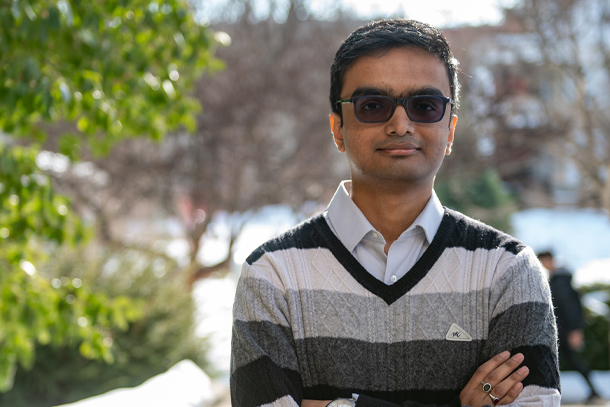
Abhronil Sengupta, the Joseph R. and Janice M. Monkowski Career Development Assistant Professor of Electrical Engineering. Kelby Hochreither/Penn State
Abhronil Sengupta receives 2024 NSF CAREER Award
March 13, 2024
UNIVERSITY PARK, Pa. — Abhronil Sengupta, the Joseph R. and Janice M. Monkowski Career Development Assistant Professor of Electrical Engineering in the Penn State College of Engineering, earned a five-year, $500,000 U.S. National Science Foundation (NSF) Early Career Development (CAREER) Award for a project titled “Rethinking Spiking Neural Networks from a Dynamical System Perspective.”
Q: What do you want to understand or solve through this project?
Sengupta: Artificial intelligence (AI) systems have made significant advancements over the past few years and currently impact multiple aspects of our everyday lives. Neuromorphic, or “brain-inspired,” algorithms are a category of emerging AI algorithms that forge stronger connections with neuroscience and attempt to harness the brain’s computational efficiency. However, these systems are primarily limited to simple neural network architectures and static tasks, like processing images.
We plan to address this limitation by rethinking neuromorphic algorithms from a dynamical systems perspective to evolve and keep pace with the latest advancements in deep learning applications enabled by large language models, like ChatGPT. We also plan to efficiently implement such models in resource-constrained environments, such as mobile phones, by achieving online local learning.
Q: How will advances in this area impact society?
Sengupta: The research can have far-reaching impacts on the semiconductor and AI industries as well as society at large, where disruptive computing paradigms like neuromorphic computing, emerging device technologies and cross-layer optimizations can potentially achieve significant improvements in data-intensive machine learning workloads. If successful, the research has the potential of developing scalable, robust, power- and energy-efficient neuromorphic computing paradigms that are applicable to a broad range of sequential processing tasks. For instance, AI systems running on edge devices like virtual reality glasses or mobile phones can now learn the preferences, writing and speaking styles of the user in an online environment locally in the device, thereby providing data privacy, personalization and limited internet bandwidth operation.
Q: Will undergraduate or graduate students contribute to this research? How?
Sengupta: The project includes a research, education and outreach plan that focuses on training the next generation of researchers and engineers in machine learning and nanoelectronics, including graduate and undergraduate researchers, K-12 participants and researchers from underrepresented groups. It also considers interdisciplinary curriculum development and online educational module development. Additionally, the cross-layer nature of the project, ranging from machine learning and dynamical system modeling to cutting-edge AI applications and hardware design, will serve as an ideal platform to pursue an interdisciplinary workforce development program.
Q: The NSF CAREER award not only funds a research project, but it also recognizes the potential of the recipient as a researcher, educator and leader in their field. How do you hope to fulfill that potential?
Sengupta: The NSF CAREER award is a critical step toward my long-term career goal to enable cognitive AI systems that can operate with the energy efficiency of the brain through a cross-layer software-hardware co-design effort from algorithms to devices, circuits and systems. Training students to bridge this knowledge gap across disciplines forms the basis of my long-term educational goals.



